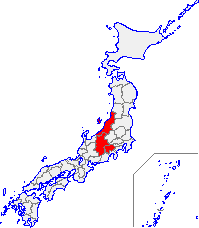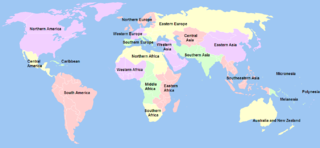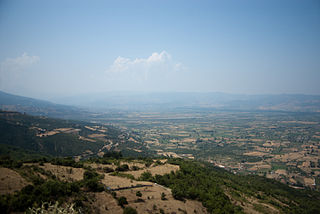Mai-Aini | |
|---|---|
| Country | |
| Region | Debub |
| Time zone | UTC+3 (GMT +3) |
Mai-Aini subregion is a subregion in the Debub region of Eritrea.
Mai-Aini | |
|---|---|
| Country | |
| Region | Debub |
| Time zone | UTC+3 (GMT +3) |
Mai-Aini subregion is a subregion in the Debub region of Eritrea.

The Tōkai region is a subregion of the Chūbu region and Kansai region in Japan that runs along the Pacific Ocean. The name comes from the Tōkaidō, one of the Edo Five Routes. Because Tōkai is a sub-region and is not officially classified, there is some disagreement about where exactly the region begins and ends, however Japanese maps widely conclude that the region includes Shizuoka, Aichi, Gifu and Mie prefectures.

Kōshin'etsu (甲信越) is a subregion of the Chūbu region in Japan consisting of Yamanashi, Nagano, and Niigata prefectures.

A subregion is a part of a larger geographical region or continent. Cardinal directions are commonly used to define subregions. There are many criteria for creating systems of subregions; this article is focusing on the United Nations geoscheme, which is a changing, constantly updated, UN tool based on specific political geography and demography considerations relevant in UN statistics.

Sadriddin Ayni was a Tajik intellectual who wrote poetry, fiction, journalism, history, and a dictionary. He is regarded by Tajiks as Tajikistan's national poet and one of the most important writers in the country's history.

The Península de Setúbal is a NUTS II subdivision of Portugal. Comprising several municipalities and urban centres, the subregion's capital is Setúbal, and includes several other cities including Almada.

The six regions of Eritrea are divided into administrative subregions.

Tajik literature and its history is bound up with the standardisation of the Tajik language. Tajik literary centres include the cities of Bukhara and Samarkand, currently in present-day Uzbekistan but with a majority Tajik population and Balkh and Herat in Afghanistan.

Qasr El Eyni Hospital is a research and teaching hospital in Cairo, Egypt. This hospital is affiliated with the Cairo University Faculty of Medicine. The hospital was founded on March 11, 1827.

Yalgoo is an interim Australian bioregion located in Western Australia. It has an area of 5,087,577 hectares. The bioregion, together with the Avon Wheatbelt and Geraldton Sandplains bioregions, is part of the larger Southwest Australia savanna ecoregion as classified by the World Wildlife Fund.

Subregions of Hungary were subdivisions of Hungary, dividing the twenty counties of Hungary into 175 administrative subregions. The subregions were abolished and replaced by 198 districts in 2013.
Mai-Mne subregion also call(Quahayn tigrigna ቋሓይን) is one of the 12 important subregions of the Southern region in Eritrea. It is known for its natural resources like gold and many types of granites. The people of this sub region are mostly farmers.

There are nearly 70,000 hectares of vineyards in Serbia, producing about 425,000 tons of grapes annually. The majority of Serbian wines are produced in local wineries.
The Western Region of Uganda is one of four regions in the country of Uganda. As of Uganda's 2014 census, the Western region's population was 8,874,862.
A subregion or sub-region is a designation for an administrative division in some countries.

Ainis or Aeniania (Αἰνιανία), was a region of ancient Greece located near Lamia in modern Central Greece, roughly corresponding to the upper valley of the Spercheios river.
Biduanita Negara Datuk Hajah Sharifah Aini binti Syed Jaafar, better known by her stage name Sharifah Aini, was a Malaysian singer, known as Biduanita Negara or "National Songstress" after the late Salmah Ismail (Saloma). She won first place in the Radio Television Singapore (RTS) talentime contest "Bintang RTS" competition in 1968, singing "Tiga Malam". She was famously known as Kak Pah.

The Aegean Region (TR3) is a statistical region in Turkey.

The West Black Sea Region (TR8) is a statistical region in Turkey.

The Southeast Anatolia Region (TRC) is a statistical region in Turkey.
The refoulement of Eritrean refugees consists of the forceful return of Eritrean refugees from Ethiopia back to Eritrea, while international law requires non-refoulement. The New York Times, Europe External Programme with Africa and Human Rights Concern Eritrea claimed that Eritrean refugees were forcefully returned to Eritrea during the Tigray War that started in late November 2020 from the Hitsats and Shimelba refugee camps. On 2 February 2021, there were 20,000 unaccounted for Eritrean refugees according to the United Nations High Commissioner for Refugees following a visit to Ethiopia.